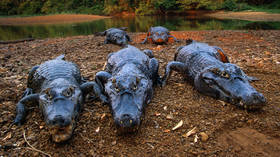Reptiles occupy riviera (VIDEO)

A video purporting to show thousands of crocodiles hauled out on a Brazilian beach went viral last week and triggered arguments over whether the giant lizards were really the ones invading the pleasure spot. Newsweek’s fact-checkers attempted to put the story to bed on Friday, declaring the marauding creatures were alligators and that they came in peace.
The clip, seen 10.3 million times, shows thousands of brown caiman (a type of reptile more closely related to alligators than crocodiles) sunning themselves on the edge of a river in the Pantanal, the largest tropical wetland in the world. It was originally posted by sporting goods company Pantanal Pesca on Instagram with the caption “I think there’s a little water in this alligator, lol. I’ve never seen so many together…”
Social media users quickly let their imaginations run wild. Twitter user @RAF_Valerie called the phenomenon an “invasion of crocodiles” and claimed the local population was “panicking,” even suggesting the haulout was due to “a volcano or earthquake” on the horizon.
🇧🇷🐊 In #Brazil, an invasion of #crocodiles that have flooded one of the beaches with several hundred, even thousands, and the local population is panicking.Are the animals worried about something? A #volcano or an #earthquake is preparing?😰👇👇👇 pic.twitter.com/m8W05HDSli
— Attractive Patriot (@RAF_Valerie) September 13, 2022
Other users questioned that version of events. “Call it Reclamation,” one person argued. “Thousands of crocodiles have flooded a beach to reclaim their home, once encroached by humans.”
This not a beach, neither an invasion. It is just a beautiful view of Brazilian caymans in their natural habitat, at Nabileque River, as seen from MS-195 road, in the middle of “Pantanal” wetlands.Local human population: 0.In panic: 1 radio broadcaster from LA. 😉🤣 pic.twitter.com/0ZtRDDh1NE
— André Gonçalves Bidá (@andre_bida) September 16, 2022
Newsweek’s fact-checkers confirmed that the Pantanal was indeed the caimans’ rightful home, boasting “the largest concentration of crocodiles in the world, with approximately 10 million caimans,” according to the World Wildlife Fund. In comparison, there are only about 206,000 humans in the area.












